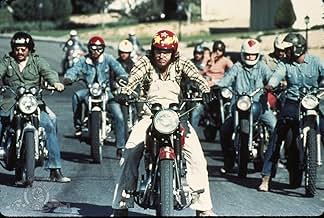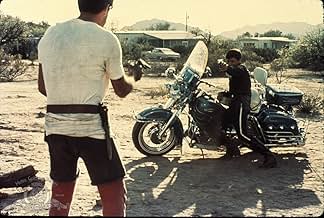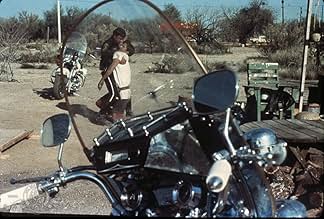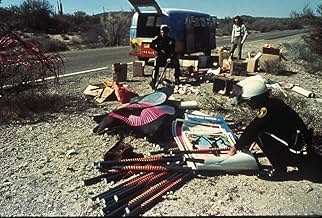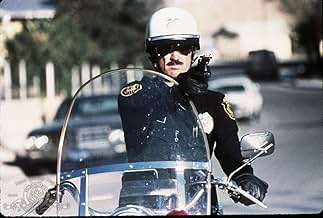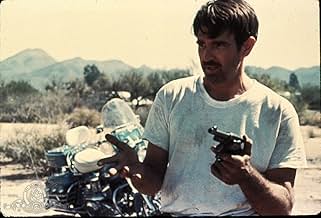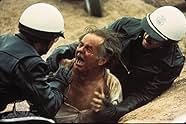IMDb रेटिंग
7.0/10
6.9 हज़ार
आपकी रेटिंग
अपनी भाषा में प्लॉट जोड़ेंA motorcycle cop with a Harley-Davidson ties hippies to a murder in the Arizona desert.A motorcycle cop with a Harley-Davidson ties hippies to a murder in the Arizona desert.A motorcycle cop with a Harley-Davidson ties hippies to a murder in the Arizona desert.
- पुरस्कार
- 3 कुल नामांकन
Billy Green Bush
- Zipper
- (as Billy 'Green' Bush)
Elisha Cook Jr.
- Willie
- (as Elisha Cook)
Hawk Wolinski
- VW Bus Driver
- (as David J. Wolinski)
Melissa Greene
- Zemko's Girlfriend
- (as Melissa Green)
फ़ीचर्ड समीक्षाएं
EGinB should be seen as an anthem to early 70's America, and the ringing messages of all road movies at the time.The film is unique as a tour de force from a director who knew precisely what he was doing.From the opening scene, with it's brilliant use of close-ups, to the final incredible draw-back, EGinB relentlessly drives home the message of post-Vietnam America, with themes of honesty,realization,ruthlessness and duty.As in other Road Movies, the Road is the conduit along which America travels for hope and redemption.The implication is that it is only in the expanse and purity of the Big Country that these ideals can be attained.
Blake seizes his opportunity to wrest his character, Wintergreen, out of the Vietnam War and into a troubled American Society; not without a little resentment along the way. His remark to the truckdriver he books, displays his feelings; " I'll give you,what they gave me (in Vietnam)...nothing". His ideals of right and honesty give way eventually to acceptance of the system, with all it's failings.
The photography is beautiful and skillful, lending a curious winsome nostalgia to the Great American Outback.Wintergreen's gleaming bike,( the Electra Glide of the title), deserves a credit of it's own. EGinB has an ending that audiences have argued about for 30 years. I think it is an original devize by the director, that emphasises the plight of nations and individuals, who trade honesty and integrity for mundanity and compromise.Additionally, what you are really watching during the long 7 1/2 minutes drawback, is a pictorial unfolding of the American flag.This echos the ' God bless America ' lyrics of the Big Elk soundtrack.Watch it, and listen to the music of Big Elk as it unfolds.It somehow encapsulates the film and it's themes, and is mesmeric for that. See it, but realize what you are watching; it's worth the research; and you'll never see a Volkswagan Camper in the same light again!
Blake seizes his opportunity to wrest his character, Wintergreen, out of the Vietnam War and into a troubled American Society; not without a little resentment along the way. His remark to the truckdriver he books, displays his feelings; " I'll give you,what they gave me (in Vietnam)...nothing". His ideals of right and honesty give way eventually to acceptance of the system, with all it's failings.
The photography is beautiful and skillful, lending a curious winsome nostalgia to the Great American Outback.Wintergreen's gleaming bike,( the Electra Glide of the title), deserves a credit of it's own. EGinB has an ending that audiences have argued about for 30 years. I think it is an original devize by the director, that emphasises the plight of nations and individuals, who trade honesty and integrity for mundanity and compromise.Additionally, what you are really watching during the long 7 1/2 minutes drawback, is a pictorial unfolding of the American flag.This echos the ' God bless America ' lyrics of the Big Elk soundtrack.Watch it, and listen to the music of Big Elk as it unfolds.It somehow encapsulates the film and it's themes, and is mesmeric for that. See it, but realize what you are watching; it's worth the research; and you'll never see a Volkswagan Camper in the same light again!
With those evocative images and that emotionally charged music, the final fifteen minutes are electrifying. It's all about America, and a terrible ten years of assassinations, Viet Nam, and countless other cultural strife. The film's ending is saying ... enough is enough. Let the healing begin. And as American culture bled in the late 1960s and early 1970s, so too did the emotional lives of individuals, like the hodgepodge of aggrieved characters that come and go in this story.
Seeing some of these people and listening to their individual stories of pain and suffering is John Wintergreen (Robert Blake), a by-the-book Arizona motorcycle cop, short on stature but tall on dreams. Sometimes with his partner Zipper (Billy Green Bush), "Big John" encounters these tormented souls, on the road mostly. That's his job. The film's story is an ode to the courage and nobility of ordinary Americans pained by reality with only their dreams to comfort them.
The film's disjointed plot begins with a killing. And this incident keeps the plot moving. But "Electra Glide In Blue" is mostly a character study, not a crime film. Color cinematography is quite good. Interior shots have lots of close-ups, even extreme close-ups. There's a lot of diffuse lighting. Exteriors are shot like a modern-day Western. Indeed, the look and feel of the film is similar in some ways to the old John Ford Westerns, like "The Searchers".
The plot is the main weakness of the film. Some parts are overplayed, like the chase scenes. There's a lack of continuity both in storyline and in visual elements. It's as if many scenes were shot impromptu, on the rush. And some of the acting is way over the top. However, Robert Blake does a fine job as America's everyday cop with his sense of principles.
This film reminds me in some ways of "Zabriskie Point" (1970), a counter culture film which has a powerful ending that helps to make up for earlier plot problems.
Based on a real-life event, "Electra Glide In Blue" gets off to a slow start. Even midway through, one wonders whether this film is going anywhere or has any point to it. It is, and it does. You just have to wait for that powerful ending and its cinematic message of a tormented America, from the point of view of one lonely cop, just doing his job.
Seeing some of these people and listening to their individual stories of pain and suffering is John Wintergreen (Robert Blake), a by-the-book Arizona motorcycle cop, short on stature but tall on dreams. Sometimes with his partner Zipper (Billy Green Bush), "Big John" encounters these tormented souls, on the road mostly. That's his job. The film's story is an ode to the courage and nobility of ordinary Americans pained by reality with only their dreams to comfort them.
The film's disjointed plot begins with a killing. And this incident keeps the plot moving. But "Electra Glide In Blue" is mostly a character study, not a crime film. Color cinematography is quite good. Interior shots have lots of close-ups, even extreme close-ups. There's a lot of diffuse lighting. Exteriors are shot like a modern-day Western. Indeed, the look and feel of the film is similar in some ways to the old John Ford Westerns, like "The Searchers".
The plot is the main weakness of the film. Some parts are overplayed, like the chase scenes. There's a lack of continuity both in storyline and in visual elements. It's as if many scenes were shot impromptu, on the rush. And some of the acting is way over the top. However, Robert Blake does a fine job as America's everyday cop with his sense of principles.
This film reminds me in some ways of "Zabriskie Point" (1970), a counter culture film which has a powerful ending that helps to make up for earlier plot problems.
Based on a real-life event, "Electra Glide In Blue" gets off to a slow start. Even midway through, one wonders whether this film is going anywhere or has any point to it. It is, and it does. You just have to wait for that powerful ending and its cinematic message of a tormented America, from the point of view of one lonely cop, just doing his job.
An incredible piece of film making, this beautifully shot movie really is about as poetic as it's possible for cinema to be and still have a coherent, gripping narrative. It feels like a western with its dramatic monument valley backdrop and masculine themes, but plays more like a European movie, with it's dark characterisations and existential mood . The soundtrack is fantastic and the feeling the movie imparts is unique. I always recommend this film to people because so few have ever seen it. I think it's a tragedy that James Guercio didn't make more movies because this was his first (and only) film and it's up there with the best of Peckinpah/Leone/Boorman/Seigal (whose work is similar). I'll never forget this film and the ending will live with me forever. If you like movies you need to see this film, This is real Cinema.
Before he found himself on the wrong side of a murder investigation, Blake was noted for playing an unconventional cop on the TV show "Baretta" (and also the flip side as a brutal killer in the film "In Cold Blood".) Here he is a square peg trying to fit into a round hole as a California Highway Patrolman with dreams of more. At 5'4", he is a full head shorter than the shortest of his fellow motorcycle-riding fellow officers. Though his cohort Bush balances his days between sitting on his bike reading comic books and listening to the radio with pulling over anyone even remotely suspicious, Blake yearns to be a better cop than that and, ultimately, a detective. When (after a thoroughly gripping opening sequence) a man is found shot to death, Blake seizes the opportunity to piece the situation together and becomes the driver and right hand man to hotshot detective Ryan. As the pair attempts to solve the mystery of the man's death, their faults, attributes and insecurities are laid bare (notably in an extended scene with Riley, a barmaid who has known both men for a long time.) Finally, the truth of the death comes to light, but only after significant turmoil, carnage and some surprises. Blake is terrific in the lead. He perfectly captures the awkwardness mixed with ambition of his character. He has many memorable scenes, more than a few of which that poke fun at his size (though he was in great physical shape at the time.) Bush lends strong support as his rather amoral buddy. Ryan is splendidly authoritarian and paints a memorable portrait of a man who is a big shot (especially in his own mind) every time and everywhere except when it counts. He is perfect in the role. Cook has a very showy and effective role as a mentally challenged old man who discovers the body. Riley is effective in her sleazy, but sympathetic role, but her big scene does seem out of place somehow and shifts the focus of the movie more than it probably ought to. Dano, a strong character actor in countless TV and film projects, does an excellent job as a jaded coroner (a far cry from "Quincy M.D.", he not only eschews a surgical mask, but smokes a cigarette during the autopsy!) The film is gorgeously photographed and extremely creatively directed. It had to be way ahead of its time in terms of camera-work. The texture and atmosphere of the scenes is beyond most of what is cranked out today. It's also loaded with quirkiness and irony (some might say overloaded.) In any case, it's a unique viewing experience with many rewards for the patient and incisive viewer. There's also a motorcycle chase that rivals any of the best from this period. Like so many films, the only way it can be fully appreciated is in the widescreen format. The glimpses of Monument Valley are welcome and add much to the visual appeal of the film. The film isn't completely flawless, but it is highly memorable. The title refers to the make and color of a motorcycle.
Pigs! Killers! Fascists! Anti-cop? Not a chance. The locals took one peek at the script and threw the entire film crew out of their precinct, and escorted them to the edge of town and beyond. Wow! Sharp bikes. And movie title. Robert Blake is dead on right as the highway cop. He makes up for in height by what he delivers in toughness and compassion. Miss Jeannie Riley plays the love interest of both Blake and his superior. She has a lengthy bar room scene bordering on religious fervor and regret. Nifty character turns by veterans Elisha Cook Jr. and Royal Dano. The action sequences are staged and edited with flair. The great cameraman, Conrad T. Hall, experimented with the interiors, flooding the camera lens with smoke, diffused light and warped, fun house-type angles. Memorable moments one and two: Blake has two great dress-up scenes. The first involves his uniform and motorcycle. The second concerns his new threads when he makes detective. An old do-wop group, The Marcels, invades the soundtrack with the flip side of "Blue Moon." However, the best musical cue occurs at the end of the film. The closing song, "Tell me," written by the producer/director/composer, James W. Guercio, of this film, is a masterpiece of the rock genre. Worthy of an Oscar or Grammy, the song begins with a nod to Blood, Sweat and Tears, travels to Chicago and, later, dismounts in Spectorville. A road and a movie well traveled. And taken
क्या आपको पता है
- ट्रिवियाFirst-time director James William Guercio wanted Conrad L. Hall to photograph this film, but Hall's salary was more than was budgeted for a cinematographer. Guercio reduced his own salary to $1.00 so he could secure Hall as the cinematographer.
- गूफ़In the final driving scenes, the van and the bike, supposedly driving along a long straight road, drive by the same distant butte at least three times.
- भाव
Harve Poole: Incompetence is the worst form of corruption.
- इसके अलावा अन्य वर्जनJohn Wintergreen is called John Winterberg in the German version.
- कनेक्शनEdited into The Our Gang Story (1994)
टॉप पसंद
रेटिंग देने के लिए साइन-इन करें और वैयक्तिकृत सुझावों के लिए वॉचलिस्ट करें
- How long is Electra Glide in Blue?Alexa द्वारा संचालित
विवरण
बॉक्स ऑफ़िस
- US और कनाडा में सकल
- $16,00,000
- चलने की अवधि
- 1 घं 54 मि(114 min)
- रंग
- ध्वनि मिश्रण
- पक्ष अनुपात
- 2.39 : 1
इस पेज में योगदान दें
किसी बदलाव का सुझाव दें या अनुपलब्ध कॉन्टेंट जोड़ें


